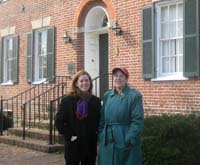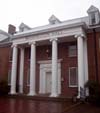
|
|
|
|
|
Ghostly Tales Offered on
University Tours
Maryland Newsline Friday, Oct. 27, 2006; additional photos added Oct. 31; audio added Nov. 1 COLLEGE PARK, Md. - Night watchmen in the University of Maryland’s Marie Mount Hall claim that on dark and stormy nights, they can hear someone playing the piano. At night in Morrill Hall, people have reported hearing marching feet outside the building. And more than one person at the Tawes Fine Arts Building has heard persistent footsteps echoing throughout the theatre when no one appears to be there. OK, the anecdotes aren’t exactly worthy of a Stephen King novel. But the university, with its 150 years of history, has its fair share of skeletons. Some say they creak and groan. The groups snaked across campus, starting in one of the university’s oldest buildings, the Rossborough Inn, constructed between 1804 and 1812. At various points in its history the building has served as a way station for stage coaches, a dormitory for faculty and students and a reception hall. According to folklore, the inn hosts several
spirits, Turkos said. “All of a sudden a cold, cold breeze went right by my face, and I looked up and there was this faint outline of a face, and then it disappeared,” said Donnelly, 67. Donnelly later said he saw the ghost in a hallway. He describes her as a “young lady” in her mid 20s or early 30s wearing an old yellow dress with a white apron. Other people who have worked in the inn have reported doors closing on their own, echoes of unexplained footsteps and vases appearing out of nowhere, Turkos said.
“I’m going to tell you the truth; I don’t believe in a ghost,” said Donnelly, who came to the university in 1968 after serving 11 years in the Army in Vietnam. “I’m a Catholic. I do believe we’re going to go somewhere. "But this, I can’t explain it.” Anecdotes such as those are ones the archivist would like to investigate further, said assistant archivist Elizabeth McAllister, who led her own tour group. On the tours, the archivists' blend of folklore and history seemed to satisfy the crowds. Tour groups moved from the inn to Marie Mount Hall, constructed in 1940 and later named after the former dean of home economics, who some say still resides in the building. “Maybe, just because she likes the building, she decided to stay,” said McAllister, 26. Turkos said some have claimed to see the eyes in Marie Mount’s portrait, still hanging in the hall, track those who pass it. Others
have wondered if she’s playing the piano music they’ve heard at night. There
is no piano in the building. The tours, which began at 10:30 p.m. and lasted until just
before midnight, were arguably less boo than history. “I guess [it’s] more interesting than scary,” said
Natasha McGee, a 21-year-old criminology major. “I don’t know about marching and all that stuff, but I
do believe that you can still feel spirits of people around you,” she said.
Bias, a former student and university men’s basketball player, overdosed on cocaine in a dorm room in Washington Hall in June 1986, days after being drafted by the Boston Celtics. Dead for 20 years, Bias’ name lives on at the university. Some students say that isn’t the only thing that remains of the former basketball star. “A number of students that have lived in that dorm room since Len’s death report that they have heard the sound of a basketball bouncing in the middle of the night, and they attribute that to that particular tragedy,” Turkos said.
|






